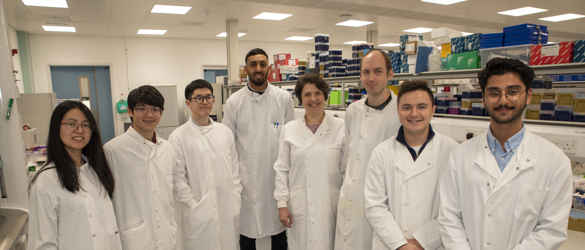Stopping the build-up of toxic waste in dry AMD

Dr Arjuna Ratnayaka, University of Southampton - £100,503
With age-related macular degeneration (AMD), large amounts of toxic waste can build up in the cells of the retina. The toxic waste, called lipofuscin, is broken down by lysosomes, which are the healthy cells’ waste removal system.
In dry AMD, the retinal cells are unable to break down and remove the toxic waste, which can result in the early death of those cells.
What was the problem?
Dr Ratnayaka and his team at the University of Southampton were aiming to improve understanding of the toxic waste build-up and find treatments to remove it. They were also looking at ways to boost the breakdown of lipofuscin and activate the waste removal system.
As part of the PhD studentship, Rebecca Miller investigated the features which cause an increase in waste and lipofuscin accumulation. The team aimed to understand how to keep the retina healthy and functioning longer to stop the vision loss that dry AMD causes.
What did the project achieve?
The initial findings of the research discovered how lysosomes break down toxic waste in the retinas of patients with dry AMD. They also found that lysosome defects can contribute to the development of RPE dysfunction. Since much of the data is still being analysed, the final results from this research will be published at a later date.
What’s next?
Much has been learned from this project about lysosomal dysfunction in RPE cells. With the toxic waste build up in retinal cells, and factors such as age, Dr Ratnayaka and his team believe more research into the causes of lipofuscin accumulation is needed in order to find a new treatment for dry AMD.
Want to know more?
To learn more about Dr Ratnayaka's research, watch the video below.
See our other projects
Since 1987 the Macular Society has invested around £10 million in over 100 research projects.
Explore more research
Beating macular disease through funding medical research and improving the lives of those living with macular disease.
Get the latest research news from the Macular Society
To hear about life-changing research and treatments, subscribe to our monthly enewsletter today. Together we can Beat Macular Disease.
Sign up to our free email newsletter



